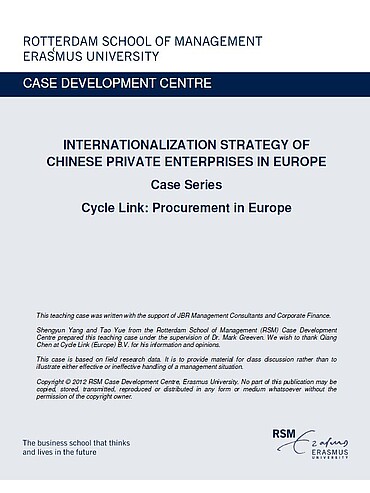Citation Note
Based on field research; 6 pages.
See also: Internationalization Strategy of Chinese Private Enterprises in Europe Case Series
Chemre: Learn from Crisis (http://www.ecch.com/educators/products/view?id=112485); and:
Internationalization Strategy of Chinese Private Enterprises in Europe Case Series
Shuguang: Learn by Doing (http://www.ecch.com/educators/products/view?id=112487)
Follow the 'handle' link to access the Case Study on RePub.
For EUR staff members: the Teaching Note is available on request, you can contact us at rsm.nl/cdc/contact/
For external users: follow the link to purchase the Case Study and the Teaching Note.
description
This series of cases consists of three individual cases describing the internationalization strategy of Chinese private enterprises in Europe. China’s private enterprise sector is generally much more productive and profitable than its state-owned enterprise (SOE) sector. Having entered a new stage of outbound investment, an increased number of Chinese private firms have joined the “Going Global” cohort. These new investors represent many different industries from the SOE sector, usually characterized by innovation and dynamics. However, relative to the SOEs, these private sector investors were often confronted with a shortage of financial capital, capabilities, and human resources required for internationalization. These cases, therefore, display some of the characteristics of the latest Chinese investment phase in the Netherlands, such as their motivations for internationalization, global strategies, and challenges.
Abstract
This is part of a case series. Cycle Link Europe moved its European headquarters to Rotterdam, the Netherlands, in 2011 after experiencing difficulties in Germany. The company purchased and exported recovered paper from Europe to China for its own production needs. Its strategy in Europe was to outperform competitors in service areas by implementing timely pickup of goods, continual purchase, and in-time payment tactics. Since superior service was a competitive advantage, Cycle Link Europe needed good people and reliable suppliers. However, working with Western employees and suppliers did not always run smoothly - communication sometimes experienced glitches.
usage
This series of cases are suitable for MBA, EMBA and other master’s students of management and business studies, as well as executives and managers of private enterprises and SMEs. The cases can be used in courses or training on global management, organizational management, outbound foreign direct investment (OFDI) or strategy in general.
